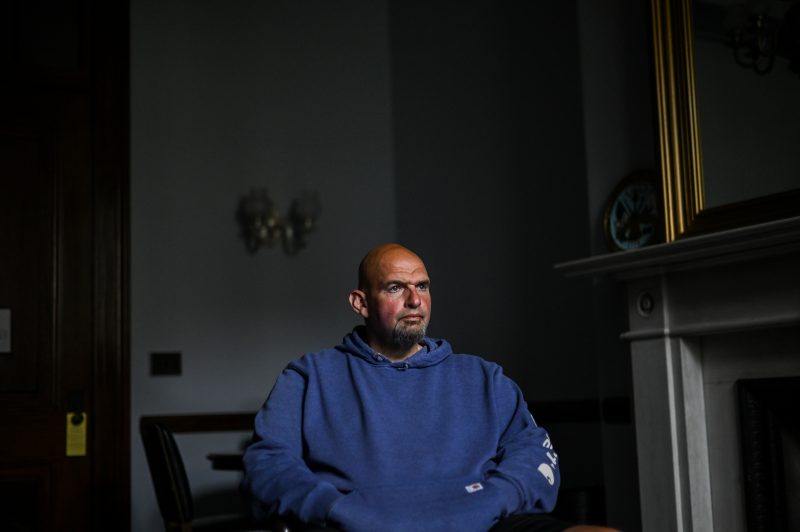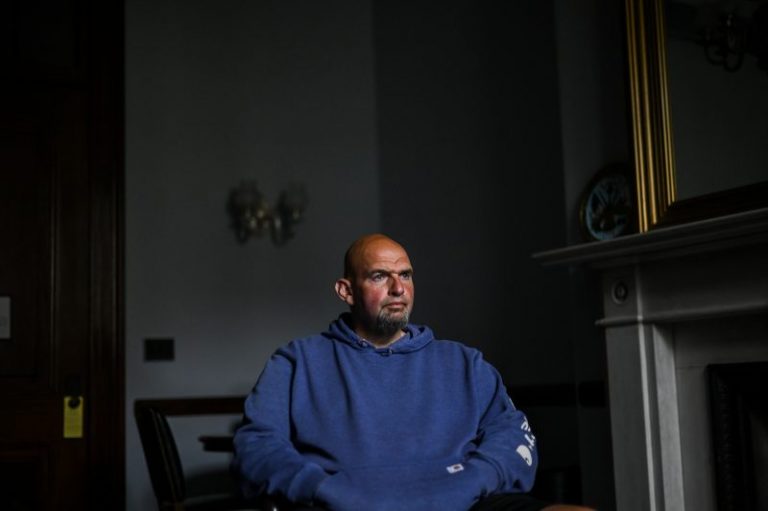
Sen. John Fetterman, weeks into his return to the Senate after an extended hospital stay to treat depression, carried out a small act of rebellion that showed a glimmer of the fiery populist who won over Pennsylvania voters last year.
The Democratic senator voted against the debt ceiling bill in early June, bucking Senate Democratic leadership and the White House. The move aligned him with Sens. Elizabeth Warren (D-Mass.) and Bernie Sanders (I-Vt.), who objected to the bill’s spending cuts. Fetterman was specifically appalled that the measure added work requirements for more people who receive food stamps.
While the vote itself was relatively low stakes — his support wasn’t needed to pass the bill — the protest vote represented a return to Fetterman’s reputation as a fighter for the little guy. He built his political brand as a nonconformist, first emerging on the national stage about a decade ago as a tattooed, tough-talking mayor who tried to revitalize a crumbling steel town near Pittsburgh.
Since returning to the Senate in mid-April, Fetterman, 53, has kept a relatively low profile — or as low as possible for a 6-foot-8, bald, goateed man who often eschews the professional attire of Capitol Hill in favor of sweatshirts and shorts. The debt ceiling vote was, in a way, the first defining act of his Senate career.
“I had the opportunity to vote my disdain for the idea that there seems to me a fetish on punishing people on SNAP versus bank presidents that almost wrecked their economy,” Fetterman said in a recent interview with The Washington Post. “I’m just the guy that’s pissed that, you know, screwing with, poor people.”
Fetterman didn’t have that fight in him when he first came to Washington as the winner of the most consequential Senate race in the country. He flipped a seat that had been held by a Republican, allowing Democrats to narrowly hold their majority. In those first weeks in D.C., he could barely get out of bed or muster the energy to eat, his brain consumed by depression’s dark thoughts. Finally, at the urging of friends and colleagues who recognized that he was in crisis, Fetterman sought inpatient treatment at Walter Reed National Military Medical Center — a decision he credits with saving his life.
“I’m looking forward to living my life and I didn’t want to live my life,” Fetterman said in an interview. “More than anything, I’m just grateful to be here, to be here, because I could have ended it. I came back and can be a functional and principled kind of representative that the people of Pennsylvania voted on and believed in me.”
On a recent afternoon, hours before he would fly home to his family, Fetterman was sitting behind his stately desk wearing his trademark Carhartt hoodie, this one a similar blue hue as the walls in the ornate room on the first floor of the 114-year-old Russell Senate Office Building. He spoke candidly about the depths of his depression in those first months in Washington and how grateful he is to be alive.
Fetterman, who suffered a near-fatal stroke more than a year ago, relies on real-time talk-to-text technology to communicate. During the interview, Fetterman read the reporter’s questions as they appeared in typed form on an e-tablet on his desk and then he answered them verbally. After the stroke, doctors diagnosed him with an auditory processing disorder, which makes it difficult for him to differentiate and understand sounds. Another lingering effect of his stroke is that his speech is often halting, and he struggles at times to find the right words.
As a candidate and now as a senator, he has endured intense scrutiny from critics who point to his often-muddled speech as evidence that he’s not well enough to do his job. An official Republican National Committee account tweeted a video recently of Fetterman at a Senate hearing struggling to articulate his thoughts about the I-95 bridge collapse outside of Philadelphia and another of him jumbling the name of a colleague.
Fetterman’s doctors have said that his lingering auditory and verbal symptoms are not an indication of a larger cognition problem. Weeks before the 2022 election, Fetterman released a letter from his primary care doctor saying that he was ready for “full duty.”
“We have been clear for literally months and months that John continues to have auditory processing issues due to the effects of his stroke,” Joe Calvello, Fetterman’s spokesman, said in response to the RNC tweet. “If sickos on the internet want to keep making fun of John for recovering from a health challenge, that’s between them and their consciences.”
Fetterman said his Republican Senate colleagues have never “said anything cruel or critical” about his health. He named Sen. Ted Cruz (R-Tex.) as someone who has been especially kind. Sen. Katie Boyd Britt (R-Ala.), a fellow freshman, visited him in the hospital.
During the grueling, high stakes campaign, Fetterman couldn’t ignore the barrage of attacks from his Republican opponent, Mehmet Oz, and other GOP critics. But now, he said, he can mostly tune it out.
“It’s so funny, I had to be part of, where the flame was during the campaign,” he said. “Now I have the small luxury of not having to search that out, sort of to live in that life — right now I am so grateful. I’m so grateful. You never know how, how, you can’t just fully appreciate being, being happy is when you, when you realize how lost you were and I was lost. To not even be, to be indifferent if I live.”
Fetterman said he never considered self harm because of his three young children, but said, “if I was to say, I was diagnosed with three months to live, I’d be like, ‘Oh, okay, whatever.’” His children couldn’t understand why he wasn’t celebrating his victory. He said they wondered why they weren’t enough.
“And that just cuts me, still just thinking about it. And I am so, so proud that my kids got through this,” he said, his voice breaking. “They couldn’t understand and I still don’t understand it myself. Why aren’t you happy? You won, and they had to watch me spiral down, down, staying in bed and not being engaged in, and just not eating or not doing much.”
Fetterman pulled out his cellphone and swiped to a text conversation he’d been having with his 11-year-old daughter, Grace, that week while he was in Washington and she was back in Pennsylvania. “I love Gracie Pie,” he wrote in one message. “Love you dad,’ she responded. She later texted that she’d heard the Beastie Boys playing and it had made her think of him. He replied, “I can’t wait to see you this afternoon!!!”
During the interview his phone chimed. “Look at that!” he said, his voice suddenly jubilant. Grace had texted back, “CAN’T WAIT!!”


Comments are closed.